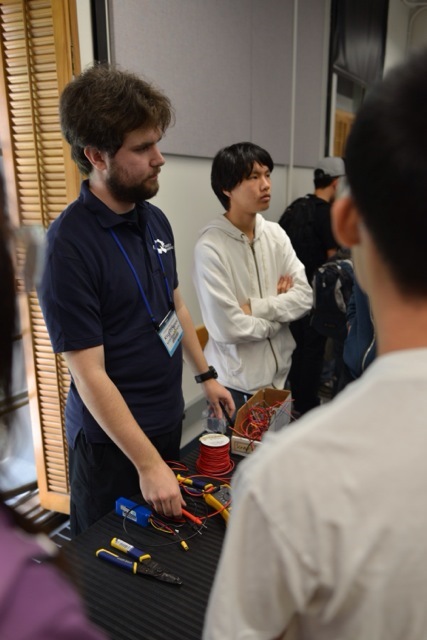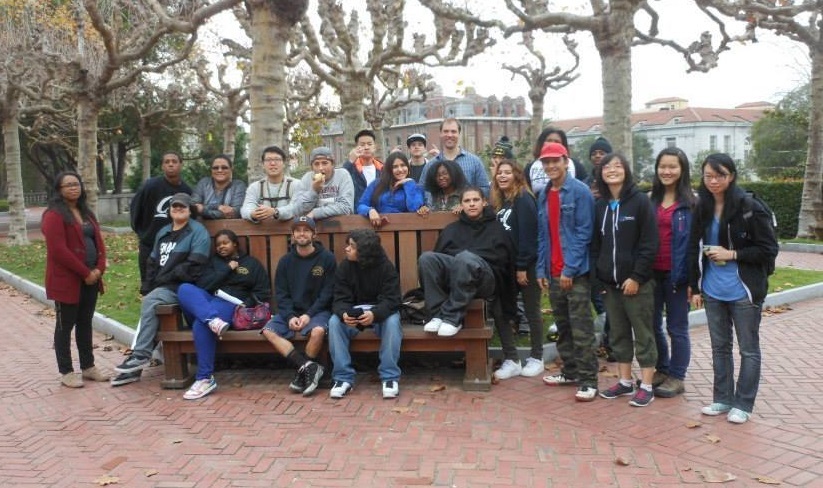We are, in a word, humbled at the selfless giving of time and energy by mentors who volunteer with Pioneers in Engineering (PiE), a student-run outreach program at the University of California, Berkeley. PiE provides science, technology, engineering and math (STEM) learning experiences through its PiE Prep mentorship program to high schoolers and annual robotics competition for grades K-12.
We are inspired by stories of the UC Berkeley students’ teaching experiences and the lives they impact as they support students who struggle daily just to make it to class and stay in school.
In an area characterized by systemic poverty, violence and high school drop-out rates, serving students in San Francisco’s East Bay has its challenges.
“We are lucky to get students to come back,” said Kyle Zentner, a junior at UC Berkeley who has participated in the program for several years as a mentor to younger students.
 Kyle Zentner (left) teaching students about batteries and electrical safety.
Kyle Zentner (left) teaching students about batteries and electrical safety.
“Many of the students are very bright, but it can sometimes be hard to recognize their potential because it is buried under many problems happening outside school walls. Many students don’t have stable families or people to support them. A lot won’t graduate,” he said.
Underneath the hardship are intelligent, impressionable minds just waiting to break through the cycle of poverty. The challenge is reaching them. However, PiE mentors have found the secret sauce to engaging their students: they make learning a game.
One favorite is friction tug-of-war, which teaches the difference between static and kinetic friction using robotics. Opponents gain a mechanical advantage using gear ratios to exert more or less force on their opponent. The more friction created, the harder the robot hits the ground.
At the end of each fall semester, PiE Prep students are also treated to a field trip, visiting the UC Berkeley campus for a tour and participating in a fun lesson. This year, students tried out a simple hover craft built by PiE mentors, which proved to be a very exciting demonstration of engineering in action.
 PiE students take a field trip to the UC Berkeley campus to get an idea of what it's like to be a college student.
PiE students take a field trip to the UC Berkeley campus to get an idea of what it's like to be a college student.
Such experiences and “lessons” provide the kind of fun, engaging experience needed to bring students out of their shell.
“It is important to make STEM concepts interesting and understandable, to show them there isn’t any wizardry,” said Kyle. “We encourage them and let them know they can do it.”
For all the fun and games, Kyle is the first to admit that PiE’s Prep mentoring program, which currently touches just two Bay area high schools, can only take students so far.
“We can’t replace their school or their teacher, though the PiE Robotics Competition and the scholarships help in the long run.”
PiE’s annual robotics competition held each spring draws more than 300 high school students across California to compete on 24 teams. Many of the students in the PiE mentorship program participate, with their PiE mentors working hand-in-hand to prepare students for the event.
Kyle sees the efforts of the UC Berkeley program as a small part of a bigger initiative, with programs similar to PiE popping up on campuses across the nation.
“I spend a lot of time thinking about the bigger picture. Today, we make a small difference, but these kids need bigger differences.”
Helping make these “bigger” differences, TI began sponsoring PiE several years ago, offering support through equipment and component donations. In 2014, our support graduated to a monetary sponsorship, doubling in 2015 to become one of the program's lead sponsors.
Like Kyle, we believe that outreach programs such as PiE are models other universities can and should emulate, bringing knowledge and resources to underserved communities that otherwise would lack the funding and technical support to participate in STEM activities.
For more information on how TI can help your university support STEM education, click here.
To read more about the impact of PiE, check out this Think.Innovate blog.
